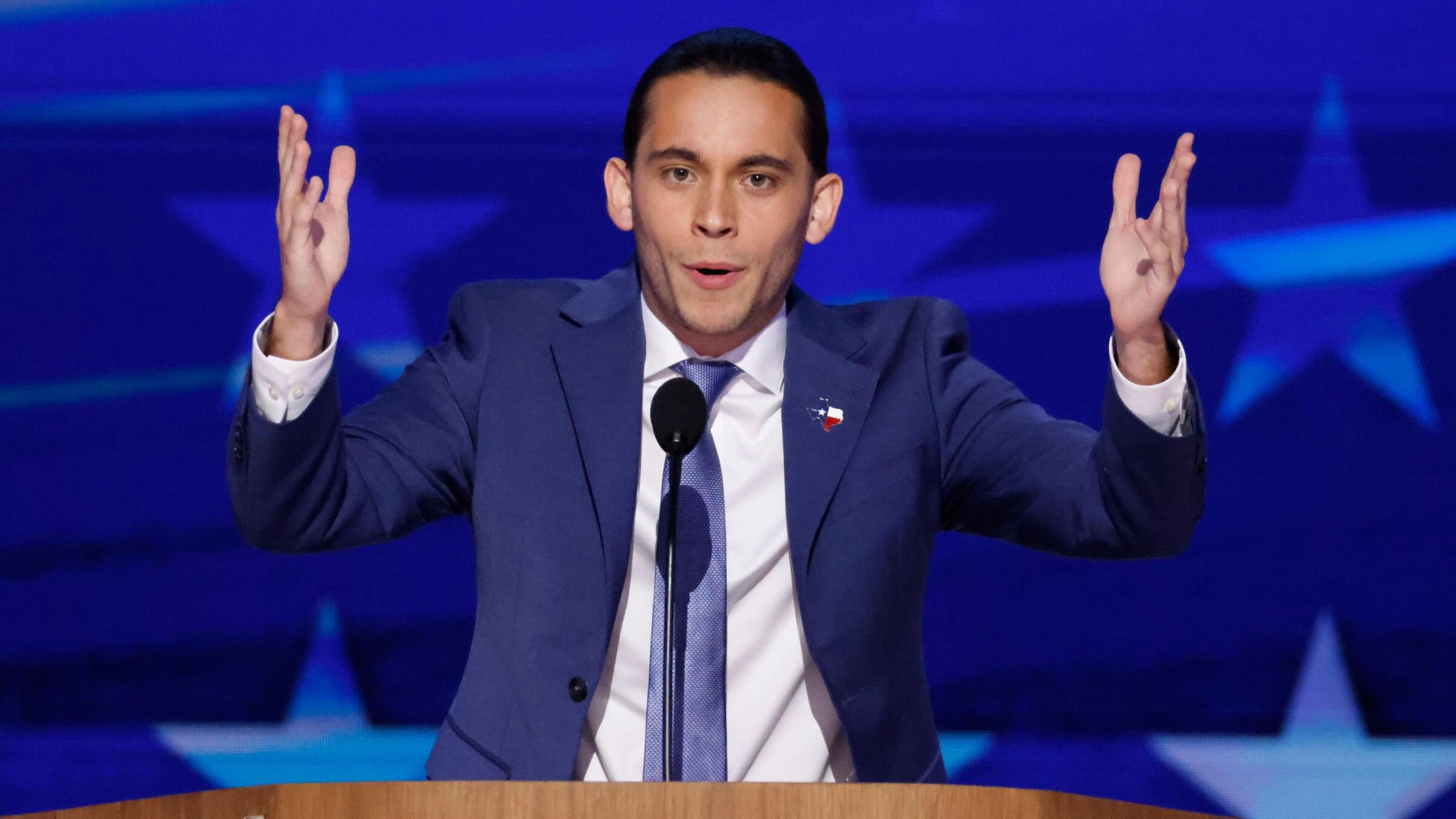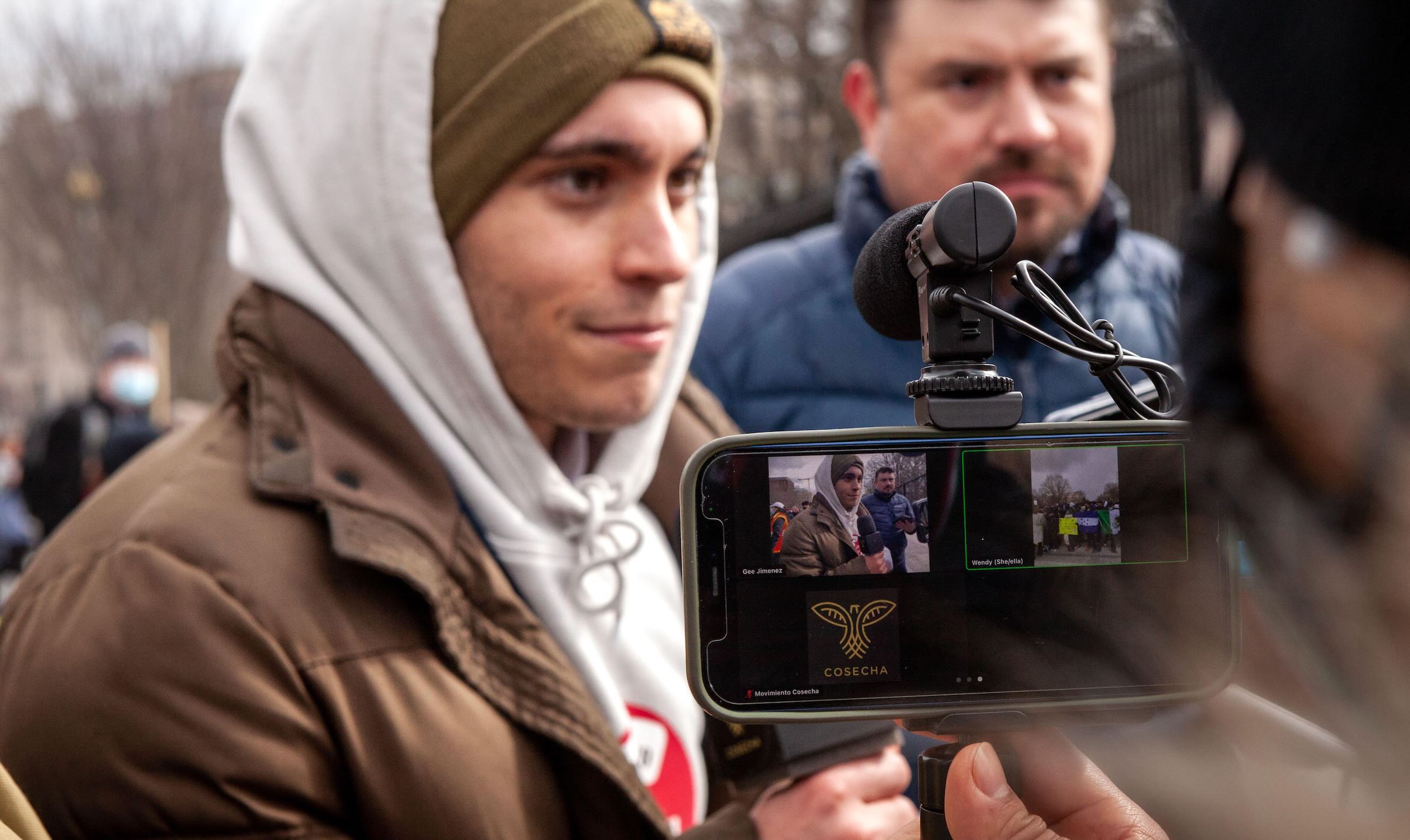Fighting for Immigrant Rights on Social Media
Immigrant rights activist. Founder and executive director of two nonprofit organizations. Law school graduate. Content creator. Social media influencer. It would be an impressive list of professional accomplishments for anyone—but Carlos Eduardo Espina ’20, at 25 years old, has more than 10 million TikTok followers to boot. And now, as of August 2024, Espina can add Democratic National Convention speaker to his résumé.

“Speaking at the Democratic National Convention was something I never imagined,” says Espina, whose invitation arrived via email two weeks prior to the event. “I was pretty nervous, as I’d never done anything like that before, but I made the most of the opportunity and made sure to represent my community in the best way possible. It’s something I’ll remember forever.”
Aptly themed “A Fight for Our Freedoms,” the night on which Espina spoke included remarks from top executives from Reproductive Freedom for All, Planned Parenthood Federation of America, the Human Rights Campaign, EMILYs List, and Voto Latino.
In his speech, Espina, who was elected President of the Vassar Student Association during his senior year, highlighted the important contributions made by immigrants in today’s society, in which “the discourse has become so hateful, dehumanizing, and anti-immigrant that the positive almost never gets attention.” He reminded roughly 50,000 attendees and everyone watching at home that “welcoming immigrants is an American value—not a Democratic or a Republican value”—and “to be pro-immigrant is to be pro-America.”
Espina’s passion for serving vulnerable and marginalized communities, which dates back to his high school days of tutoring young immigrants from Central America and teaching citizenship classes in both Spanish and English, comes from personal experience. Born in Montevideo, Uruguay, to a Uruguayan father and a Mexican mother, Espina immigrated with his family to College Station, Texas, when he was five.
As a college student, Espina established not one but two nonprofit organizations. The first, Football for the Future, an initiative for which he received Vassar’s Projects for Peace Fellowship, provides free soccer camps for hundreds of low-income children throughout Central Texas. The second, the Detained Refugee Solidarity Fund, offers financial and moral support to immigrants held in U.S. Immigration and Customs Enforcement detention centers and connects them with legal advisors, lawyers, and family members. The latter would inspire an on-campus exhibition, Dear Carlos: Mail from a Detention Complex, organized by the Consortium on Forced Migration, Displacement, and Education. Temporarily on display in the College Center, Dear Carlos featured photocopies of heartfelt correspondences between Espina and detainees along the southern border.

At Vassar, Espina also contributed to the Oviedo Project, which, by 2026, aims to produce a complete English translation and annotation of 16th-century Spanish colonist and historian Gonzalo Fernández de Oviedo’s Historia General de las Indias (General History of the Indies), the first-ever comprehensive chronicle of Spanish America.
A couple of months before graduating with his bachelor’s degree in political science and Latin American and Latino/a studies, which he earned in just three years, the coronavirus pandemic halted Espina’s in-person community activism—so he took to social media, helping Hispanic immigrants prepare for the U.S. Citizenship Test as part of the naturalization process.
“By the end of 2020, I had half a million followers and turned social media from a hobby into my job,” he recalls. “Since then, it’s been four years of consistently making content every day, but with the same passion I’ve always had.”
For his volunteer work as a tutor and mentor under the auspices of the Vassar English Language Learners Outreach Program, Espina received the Wendy Rae Breslau Award, which honors students who have “exhibited outstanding concern for the welfare and well-being of their peers and society.” At graduation, in recognition of excellence in the study of political science, he was awarded the Julia Flitner Lamb Prize.
“I wouldn’t be able to do all of the things I’ve done and continue to do if it wasn’t for Vassar,” Espina says. “I learned how to think critically, analyze, synthesize, form arguments, and many other skills that I use on a daily basis. Vassar provided me with the resources and experiences I needed to reach my goals.”
Dubbed “a one-man Telemundo on TikTok” by The New York Times and “the TikToker bridging the Spanish-language news gap” by The Boston Globe, Espina’s videos—news and views on immigration, politics, food, and sports, delivered entirely in Spanish—inform and uplift members of the immigrant community here in the United States, many of whom get their news and information from social media platforms rather than legacy Spanish-language television networks.
“I don’t pretend to compete with Telemundo, Univision, or any other traditional media,” Espina says. “I think what social media content creators are doing is something new and innovative, and that doesn’t need to be compared with other forms of communication. We all have important roles to play, and I think we’re better when we work together.”
Earlier this year, Espina earned his law degree from the William S. Boyd School of Law at the University of Nevada, Las Vegas. He plans to use his formal education and real-world experience to become an immigration attorney.
The message for which Espina hopes to be remembered is perhaps as inspiring as his work: “If you’re prepared, educated, and have the ability to adapt, especially in times of change and uncertainty, you can accomplish things bigger than anything you ever imagined.”
Helping his family and community progress, he says, is his greatest achievement of all. “It feels humbling to be able to do all of the things I’ve done,” he says. “I’m just grateful to be in this position.”
Follow Espina @carlos_eduardo_espina on TikTok and Instagram.